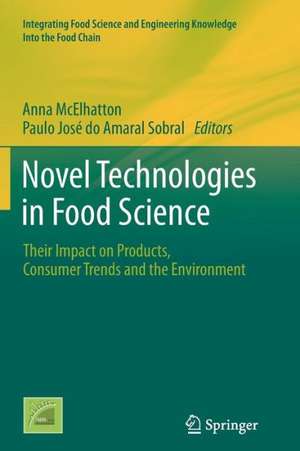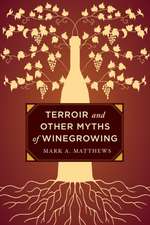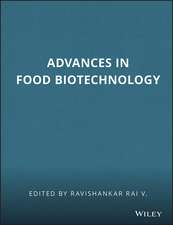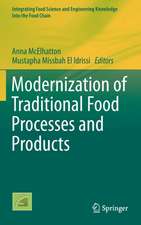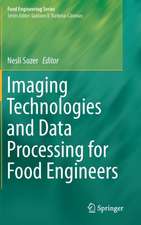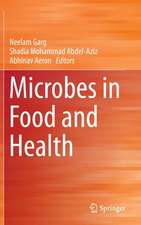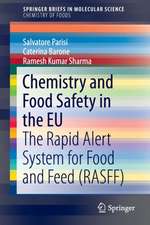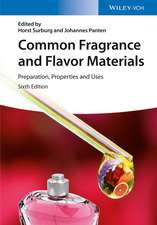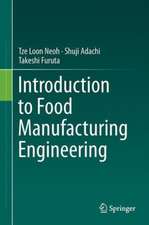Novel Technologies in Food Science: Their Impact on Products, Consumer Trends and the Environment: Integrating Food Science and Engineering Knowledge Into the Food Chain, cartea 7
Editat de Anna McElhatton, Paulo José do Amaral Sobralen Limba Engleză Paperback – 25 ian 2014
| Toate formatele și edițiile | Preț | Express |
|---|---|---|
| Paperback (1) | 951.47 lei 6-8 săpt. | |
| Springer – 25 ian 2014 | 951.47 lei 6-8 săpt. | |
| Hardback (1) | 652.31 lei 6-8 săpt. | |
| Springer – 2 dec 2011 | 652.31 lei 6-8 săpt. |
Preț: 951.47 lei
Preț vechi: 1160.32 lei
-18% Nou
Puncte Express: 1427
Preț estimativ în valută:
182.09€ • 189.40$ • 150.32£
182.09€ • 189.40$ • 150.32£
Carte tipărită la comandă
Livrare economică 14-28 aprilie
Preluare comenzi: 021 569.72.76
Specificații
ISBN-13: 9781489985835
ISBN-10: 1489985832
Pagini: 444
Ilustrații: XX, 424 p.
Dimensiuni: 155 x 235 x 23 mm
Greutate: 0.62 kg
Ediția:2012
Editura: Springer
Colecția Springer
Seria Integrating Food Science and Engineering Knowledge Into the Food Chain
Locul publicării:New York, NY, United States
ISBN-10: 1489985832
Pagini: 444
Ilustrații: XX, 424 p.
Dimensiuni: 155 x 235 x 23 mm
Greutate: 0.62 kg
Ediția:2012
Editura: Springer
Colecția Springer
Seria Integrating Food Science and Engineering Knowledge Into the Food Chain
Locul publicării:New York, NY, United States
Public țintă
Professional/practitionerCuprins
Part I. Environmental Aspects.- 1. Waste and its Rational Management.- 2. Implementation of Hazard Analysis and Critical Control Points System in the Food Industry: Impact on Safety and the Environment.- 3. Food By-Products for Biofuels.- 4. Integrated Management Methods for the Treatment and/or Valorisation of Olive Mill Waste.- Part II. Safety and Quality Considerations.- 5. Safety Considerations of Nutraceuticals and Functional Foods.- 6. Consumer Behavior: Determinants and Trends in Novel Food Choice.- Part III. Novel Process Technologies with a Green/Environmental Slant.- 7. Recent Advances in the Microencapsulation of Oils High in Polyunsaturated Fatty Acids.- 8. Biocontrol of Foodborne Bacteria.- 9. Plant Extracts as Natural Antifungals: Alternative Strategies to Mold Control in Foods.- 10. Reduction of Mycotoxins Contamination by Segregation with Sieves, Prior to Maize Milling.- 11. Rational Use of Novel Technologies: A Comparative Analysis of the Performance of Several New Food Preservation Technologies for Microbial Inactivation.- 12. Emerging Technologies to Improve the Safety and Quality of Fruits and Vegetables.- 13. Novel Technologies for the Preservation of Chilled Aquatic Food Products.- 14. Use of Natural Preservatives in Seafood.- 15. Edible Films: Use of Additives as Property Enhancers.- 16. Clean Strategies for the Management of By-Products in Dairy Industries.
Notă biografică
About the Editors
Anna McElhatton is a Senior lecturer and Head of the Department of Food Studies in the Faculty of Health Sciences at the University of Malta. McElhatton has an undergraduate degree in Pharmacy and M.Phil and PhD from the Queen’s University of Belfast in Northern Ireland. Her main research interests include food safety (of dairy products), sensory aspects of food preference, and ethical issues in research.
Paulo J. Sobral is a Full Professor and Vice-Dean of the Faculty of Animal Science and Food Engineering at the University of São Paulo (USP). Sobral is a Food Engineer with an MS in Food Engineering (UNICAMP, Brazil), and a PhD in Processing Engineering (ENSIC-INPL, France). His main research interests include glass transition of freeze-dried fruits, meat quality, and development of edible and/or biodegradable films.
About the Series Editor
Kristberg Kristbergsson is Professor of Food Science in the Department of Food Science and Nutrition at the University of Iceland. Kristbergsson has a BS in Food Science from the Department of Chemistry at the University of Iceland and earned his MS, M. Phil and PhD in Food Science from Rutgers University. His research interests include physicochemical properties of foods, new processing methods for sea foods, modernization of traditional food processes, safety and environmental aspects of food processing, extrusion cooking, shelf-life and packaging, biopolymers in foods, and delivery systems for bioactive compounds.
Anna McElhatton is a Senior lecturer and Head of the Department of Food Studies in the Faculty of Health Sciences at the University of Malta. McElhatton has an undergraduate degree in Pharmacy and M.Phil and PhD from the Queen’s University of Belfast in Northern Ireland. Her main research interests include food safety (of dairy products), sensory aspects of food preference, and ethical issues in research.
Paulo J. Sobral is a Full Professor and Vice-Dean of the Faculty of Animal Science and Food Engineering at the University of São Paulo (USP). Sobral is a Food Engineer with an MS in Food Engineering (UNICAMP, Brazil), and a PhD in Processing Engineering (ENSIC-INPL, France). His main research interests include glass transition of freeze-dried fruits, meat quality, and development of edible and/or biodegradable films.
About the Series Editor
Kristberg Kristbergsson is Professor of Food Science in the Department of Food Science and Nutrition at the University of Iceland. Kristbergsson has a BS in Food Science from the Department of Chemistry at the University of Iceland and earned his MS, M. Phil and PhD in Food Science from Rutgers University. His research interests include physicochemical properties of foods, new processing methods for sea foods, modernization of traditional food processes, safety and environmental aspects of food processing, extrusion cooking, shelf-life and packaging, biopolymers in foods, and delivery systems for bioactive compounds.
Textul de pe ultima copertă
Novel Technologies in Food Science: Their Impact on Products, Consumer Trends and the Environment, the seventh volume of the ISEKI-Food book series, discusses how novel food technologies are connected to the production of foods and how they impinge on our daily lives through consumers’ selection and continued loyalty to product types. Topics include waste and waste management, HACCP, safety issues in the use of nutraceuticals and functional foods, and green technologies to produce novel products. Like the other books in the series, this volume has chapters written by scientists specializing in the field. This book is intended for graduate students and senior level undergraduate students as well as professionals and researchers interested in both food and environmental issues applicable to sustainable food production.
Caracteristici
Covers novel technologies Synopsis of an ISEKI workshop Excellent food and biotechnology resource Includes supplementary material: sn.pub/extras
